Understanding Polymers: The Science Behind Versatile Materials
Understanding Polymers: The Science Behind Versatile Materials
Blog Article
Checking Out the Varied Applications and Benefits of Polymers in Different Industries
Polymers, with their diverse variety of residential or commercial properties and functionalities, have ended up being crucial in various industries, each reaping unique take advantage of their application. Polymers. From improving safety and performance in the automobile industry to transforming medical tools in the healthcare market, polymers play a critical role. Furthermore, their environment-friendly nature is changing the landscape of sustainability techniques. As we look into the depths of polymers in electronic devices, we discover innovative innovations, while their architectural stability changes the world of building and infrastructure. The pervasive influence of polymers across sectors is a testament to their convenience and versatility, shaping the future of numerous industries.
Automotive Field Applications
Polymers play a crucial duty in enhancing the performance and resilience of numerous elements within the automobile industry. These functional materials are thoroughly used in the manufacturing of different parts, ranging from interior parts to under-the-hood applications. One famous use polymers in the auto market is in the manufacturing of lightweight parts. By changing conventional metal get rid of polymer-based choices, lorries can attain better fuel performance without compromising on toughness or security.

Medical Care Market Advantages
In different medical care applications, the benefits of making use of polymers are commonly acknowledged for their diverse variety of helpful homes. Polymers play an essential role in the health care sector as a result of their versatility, biocompatibility, and cost-effectiveness. One of the key benefits of polymers in medical care is their capability to be tailored to certain requirements, such as adaptability, durability, and biodegradability, making them suitable for a variety of medical applications.
Polymer-based products are thoroughly made use of in medical devices, such as catheters, implants, prosthetics, and drug shipment systems, due to their biocompatibility and ability to simulate natural cells. These products can minimize the risk of sensitive responses or beings rejected, enhancing patient safety and security and end results. Furthermore, polymers are lightweight, making them ideal for wearable medical devices and making sure person convenience.
In addition, polymers allow the growth of innovative therapy methods, such as hydrogels for cells design and nanocomposites for targeted medication distribution. Their ease of handling and sanitation makes them vital for keeping high standards of health in medical care settings. Generally, the varied advantages of polymers contribute significantly to developments in clinical technology and client treatment.
Ecological Benefits of Polymers

In addition, polymers can add to energy savings because of their light-weight nature. In industries such as transport, lightweight polymer products can aid reduce fuel consumption and greenhouse gas discharges. Furthermore, polymers can allow the advancement of energy-efficient products such as insulation materials that enhance energy conservation in buildings.
Furthermore, polymers play a vital duty in minimizing water air pollution. The use of polymer-based purification systems can properly get rid of toxins and pollutants from wastewater, protecting water resources and ecosystems. On the whole, the ecological benefits of polymers make them valuable properties in advertising sustainability and green techniques across various sectors.
Polymers in Electronics and Technology
Considering the raising you could try this out demand for innovative and lasting services in modern sectors, the combination of advanced polymer modern technologies in the world of electronics and technology has actually arised as a critical method for driving effectiveness and performance. Polymers have transformed the electronics sector by making it possible for the manufacturing of lighter, much more versatile, and long lasting electronic tools. From mobile phones to clinical devices, polymers play an essential duty in boosting product layout and capability.
One significant benefit of polymers in electronics is their shielding properties, which assist protect delicate electronic parts from environmental factors and electrical disturbance. Additionally, polymers are crucial in the development of versatile display screens, wearable innovation, and published electronic devices, providing limitless possibilities for creating wise and interconnected tools.
Moreover, the usage of polymers in digital packaging has actually brought about improvements in miniaturization and thermal management, improving the general efficiency and integrity of digital systems. As technology remains to develop, the versatility and adaptability of polymers will definitely drive better innovation in the electronic devices market, shaping the future of innovation.
Function of Polymers in Building And Construction and Facilities
Polymers supply many advantages in the construction sector due to their flexibility, resilience, and cost-effectiveness. One key duty of polymers in building is their use in layers and sealants, providing defense against ecological elements such as moisture, UV radiation, and rust.
Furthermore, polymers play an important duty in sustainable construction methods click for more info by enabling the advancement of energy-efficient structures. Shielding materials made from polymers help regulate interior temperature levels, reducing the requirement for heating and cooling systems and inevitably reducing power intake. The usage of polymer-based compounds in framework projects such as bridges and roadways enhances their long life and decreases upkeep expenses. In general, the incorporation of polymers in building and construction and infrastructure displays their significant effect on contemporary design methods.
Verdict
In conclusion, polymers play an important function in different markets such as vehicle, medical care, ecological, electronic devices, and building and construction. Their functional homes make them useful in producing ingenious options and items. From enhancing fuel efficiency in lorries to enhancing clinical tools, polymers supply countless benefits. Furthermore, their influence on decreasing waste and promoting sustainability highlights their importance in modern applications. The prevalent usage of polymers demonstrates their significant contribution to progressing innovation and enhancing lifestyle.
Report this page